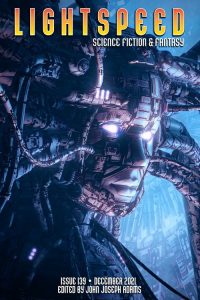Karen Burnham Reviews Short Fiction: Lightspeed, Mithila Review, Common Tongues, and Bards & Sages
 Lightspeed 10/21
Lightspeed 10/21
Mithila Review 3/21
Common Tongue 8/21
Bards & Sages 10/21
October’s Lightspeed has plenty of stories with chewy premises to enjoy. “Stowaways” by Andrew Dana Hudson is a flash piece told in the form of a museum sign explaining an art piece. This dangerous piece of art can “install” itself in viewers’ brains whenever enough “infected” people gather nearby. Its main effect is to generate companion characters that can only be seen by the infected, but the fact that it can spread to involuntary participants is disturbing. Being flash, this is a sketch of an interesting idea, but it feels like it could be fleshed out into a fully dramatized story as well. Elly Bangs brings us “Space Pirate Queen of the Ten Billion Utopias”. Ursa Major is a trans person who manages to catch an interdimensional train out of our hellhole world. Speaking with other travelers she comes to realize that most alternate Earths are not even a fraction as fucked up as ours. She and some other free spirits hijack one of the trains to call their own, but through her relationship with Calliope she comes to gain a different perspective on how our world fits in with all these comparative utopias. On the fantasy side we have “I Was a Teenage Space Jockey” by Stephen Graham Jones. Two Indian kids are mercilessly bullied, but the narrator’s older brother had been a dominant arcade player. They’re hanging out at the arcade even after he’s left town, but after being humiliated and locked in the arcade overnight they set about making their own game record with the help of a magic quarter. The space game it directs them to has much different levels than they are used to. Although there are few promising futures to be revealed for these kids, there is still hope to be found.
I’m late to the 15th issue of Mithila Review, which promotes international science fiction and fantasy. In the spirit of better late than never (it came out last March) let me say how much I enjoyed the longest piece in the issue, “Arisudan” by Rimi B. Chatterjee. Probably a novelette or novella, this is a really thorough sketch of India and Southeast Asia in the future, from 2020-2048. We get two POVs, Parzan Merchant, a mild-mannered submarine captain, and Carlton Caron, his highly intellectual first officer. At the opening of the story, apocalypse seems to sweep across the Earth and Parzan is stuck in his sub after Carlton deserts with the crew. Then we jump back and forth in time to see how this future came to be, with the rise of the megacorporation Ramdhun replacing most governmental functions, a plague affecting male babies, how Parzan winds up in the Indian Navy and meets Carlton, etc. This appears to be associated with and possibly a set up for the author’s new Antisense Universe series, and this has definitely convinced me that the novels will be worth a look. Elsewhere in the issue we have “Children Between the Lines” by Soham Guha, where a young woman submits to government registration and brain scanning so that, just once, she can remember her mother who sacrificed herself to get them out of a climate refugee camp.
Common Tongue is a new-to-me venue, and fairly new all around: August saw their fourth issue released. It leans a little farther towards horror than my usual beat, but that didn’t stop me from appreciating the stories. “Forbidden” by Carl Walmsley imagines an abbey attacked by Northmen/Vikings. Out of fear one monk summons a truly disgusting fallen angel from a forbidden tome, and we get perspectives from both one of the surviving monks and one of the surviving Vikings as they try to work together against the creature. “Jump” is a flash piece by Katie Cervenec and may be her debut publication. It describes a world where the Eminent Mother’s time is up and the narrator may take her place, if she can survive the 200-foot fall into the populace below. It ends with the climax instead of a resolution, but that’s much easier to forgive in flash than in longer stories. “Liar” by Gregory L. Norris gives us an evil seer who uses astral projection to manipulate the king, frame the princess’ true love and get her to marry him instead. Will such villainy go unpunished? He’s very clever, but there are other clever people out there. I also quite enjoyed “The Raven Figurine” by Matthew X. Gomez. Valret is a charming older thief, down on his luck and in debt to a gangster. After a commission goes bad he’s able to fight off attackers like he did in his youth thanks to the titular figurine he picked up. It gives him everything he needs to get out of his current predicament, but what will a man like him do with power like that?
It’s been awhile since I checked in on Bards & Sages, but I’m glad I did. The strongest story in the October issue is “The Corpse-Fishers’ Daughter” by Elana Gomel. This is a strange world where, after death, it is sometimes revealed that a loved one was really a “mermaid” – in this world that’s a creature that’s half fish with human legs. This is considered so shameful that these corpses are often dumped in the river, but folks like Lisa’s father fish them out and take burial goods and sometimes blackmail the families. Lisa grows up in the trade, usually disguised as a boy named Les. They meet a “reverse mermaid” (human on top with a fish tail) and after their father dies have to decide how to move forward. There are a lot of overlapping and liminal identities in Lisa/Les’ story. “The Ghost of the Dead Computer” by Ziaul Moid Khan brings fairy-tale logic to the tech world when an aspiring author’s second-hand computer gives up the ghost – and it’s only after that point that the author starts finding enormous success… when pieces he hasn’t finished drafting start showing up on best-seller lists. He’s understandably unnerved by this, but we all know what can happen when you go looking for the source of unexplained good fortune.
Recommended Stories
“Space Pirate Queen of the Ten Billion Utopias”, Elly Bangs (Lightspeed 10/21)
“Arisudan”, Rimi B. Chatterjee (Mithila #15)
“The Corpse-Fishers’ Daughter”, Elana Gomel (Bards & Sages 10/21)
“Forbidden”, Carl Walmsley (Common Tongue #4)
Karen Burnham is an electromagnetics engineer by way of vocation, and a book reviewer/critic by way of avocation. She has worked on NASA projects including the Dream Chaser spacecraft and currently works in the automotive industry in Michigan. She has reviewed for venues such as Locus Magazine, NYRSF, Strange Horizons, SFSignal.com, and Cascadia Subduction Zone. She has produced podcasts for Locusmag.com and SFSignal.com, especially SF Crossing the Gulf with Karen Lord. Her book on Greg Egan came out from University of Illinois Press in 2014, and she has twice been nominated in the Best Non-Fiction category of the British SF Awards.
This review and more like it in the December 2021 issue of Locus.
 While you are here, please take a moment to support Locus with a one-time or recurring donation. We rely on reader donations to keep the magazine and site going, and would like to keep the site paywall free, but WE NEED YOUR FINANCIAL SUPPORT to continue quality coverage of the science fiction and fantasy field.
While you are here, please take a moment to support Locus with a one-time or recurring donation. We rely on reader donations to keep the magazine and site going, and would like to keep the site paywall free, but WE NEED YOUR FINANCIAL SUPPORT to continue quality coverage of the science fiction and fantasy field.
©Locus Magazine. Copyrighted material may not be republished without permission of LSFF.






